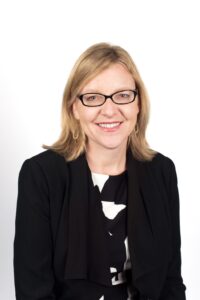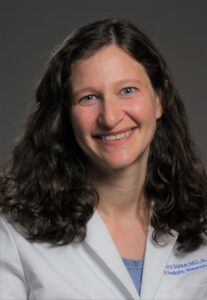Dr. Stacy Ardoin
Stacy Ardoin, MD, a Med-Peds rheumatologist at Nationwide Children’s Hospital and The Ohio State University, Columbus, conducts research on childhood-onset systemic lupus erythematosus and on the transition from pediatric to adult care for patients with rheumatic diseases.
Why did you decide to pursue both adult and pediatric rheumatology?
Dr. Ardoin: It seems that most people who choose Med-Peds like to keep their options open, and that was the case for me. I enjoyed caring for both adults and children and wanted to continue to be able to do so.
Tell us about your clinical practice of Med-Peds rheumatology.
Dr. Ardoin: Currently, my practice is more pediatric than adult as I am serving as the division chief for pediatric rheumatology. In the past, however, I have had the opposite ratio. My adult practice is limited to patients who have lupus or are transitioning to adult care from my pediatric clinic.
Tell us about your research.
Dr. Ardoin: I perform collaborative clinical research focused on lupus across the age spectrum. I have focused primarily on assessing cardiovascular risk in children and adults with lupus, helping optimize therapies for lupus nephritis and on developing strategies to improve the transition from pediatric to adult care.
How has your combined training influenced your clinical practice and research?
Dr. Ardoin: I find my pediatric experience makes me a better internist, as I am more likely to ask about, and strategize to overcome, barriers to care and understand the challenges facing young adults with childhood rheumatic disease. My adult experience makes me a better pediatrician, particularly in the care of very complex patients (who look more like internal medicine patients!) and in efficiencies in clinical care. My research tends to focus on transitions of care and long-term outcomes of childhood-onset disease, both of which are enhanced by my Med-Peds training and experience.
What would you say to a medical student or resident considering a career in Med-Peds rheumatology?
Dr. Ardoin: First, talk to some Med-Peds rheumatologists to get a sense of what they do. If you are not opposed to putting in more time, I think it is very worthwhile to do the combined training. Go for it!
Dr. Rebecca Sadun
Rebecca Sadun, MD, PhD, a Med-Peds rheumatologist at Duke University, Durham, N.C., investigates effective teaching strategies to assist pediatric and adult rheumatology fellows in developing the skills needed to successfully transition patients from pediatric to adult rheumatologic care.



